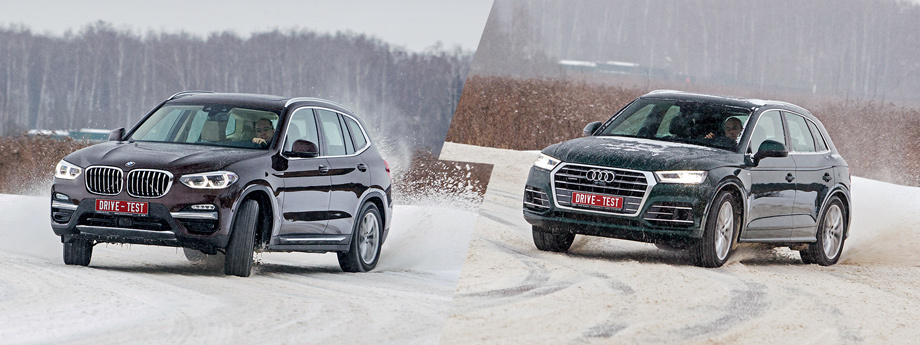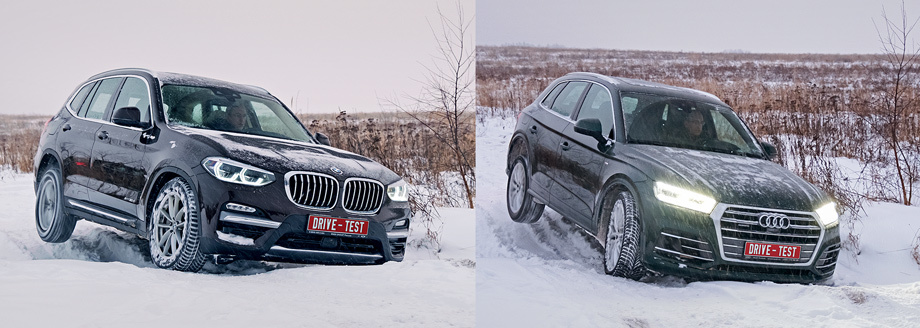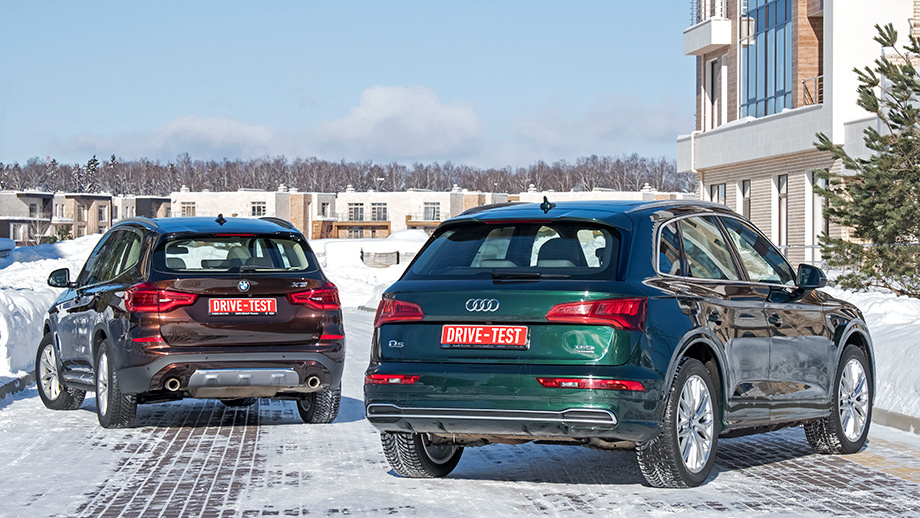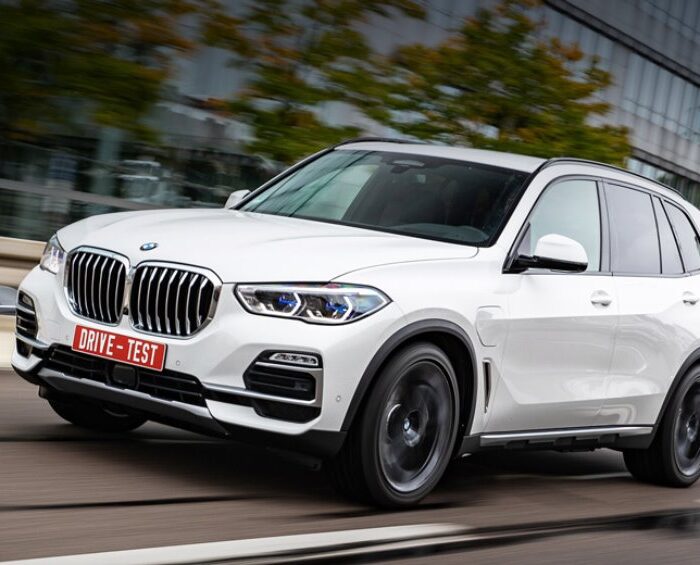I would like to compare the Audi Q5 2.0 TFSI and the gasoline BMW X3 xDrive30i, both are two-liter, four-cylinder with close output. The catch is that in the Audi press park there is only a car with air suspension. And among the test BMWs, the gasoline X3 has passive strut-beams, and besides, it has been toughened up with a sports package. But these are family cars, and it is first and foremost important for us to compare the mechatronic chassis. Therefore, we agree to xDrive30d with adaptive shock absorbers but with a diesel “six”. Thus, the X3 gets a head start in a couple of cylinders and as much as 250 N•m…
The new Q5 is hard to distinguish from its predecessor, but the resemblance to the Q7 helps. The “X” put on five centimeters in length (the base increased by the same amount) and outgrew the first generation of X5. However, it can be mistaken for the X1. The interior of the BMW has only evolved: the high seating position, the shape of the A-pillars and the side mirrors are preserved. The hood is visible even better. However, the climate control units and the audio system have changed places, the air temperature adjustment for the upper vents is hidden in the menu. There is a lot of space in front, standard seats are unusually spacious. The steering wheel is rotunder, the levers under it have become more fixed, like in the “five”.

The iDrive complex with a touch screen and gesture recognition is, in my opinion, simply the best… The main thing did not happen — a breakthrough in the field of perceived quality. If it is not possible to pay extra for options, there is nothing special to admire. You’re going to weep just having a look at the basic dashboard, as well as at the simplest display with a diagonal of six and a half inches in a thick frame. You have to pay extra for the servos of the seats, and for the silver finishing of the keys. For no money in the X3 will there be an electrified steering column, massage, heated windshield and longitudinal adjustment of the rear seats. Not everyone needs it, but that’s why it’s premium in order to provide a wide choice.
The Q5 feels lighter. Visibility is chic, thanks to thin pillars and large mirrors. There is a wish to “soften” the strict office style, familiar from the A4, with light leather and wood-like inserts, and drag sports seats home. It is important that even a modest Q5 (not from the press park) is inviting: analog devices are good and the basic “tablet” is made neatly. However, the MMI interface is inferior to “iDrive” in terms of ease of use. The transmission selector in Audi is also less ergonomic. However, you can get used to these, but can you get used to the creaking of panels on bumps? Rear legroom is parity, but the X3 has roomier headroom and shoulder room.
The petrol “four” 2.0 TFSI on the Q5 sounds bright: even more fervent and louder than the 340-horsepower V6 turbo engine of the new generation A7, which I have already managed to ride. Acceleration excites, and if you drive actively, you will make friends with the rapid-fire seven-speed robotized gearbox. But when you meander in a dense and twitchy traffic, the freezing responses to the gas interfere. In any diesel X3, even in a four-cylinder, traction control is more convenient.

BMW’s 3.0-litre turbo diesel seems all-powerful. The sound is unremarkable, but the motor is less audible than in the previous X3, and a slight vibration remains only on the steering wheel rim. The new B57 engine has the same 249 horsepower as the old N57, but with more torque. Acceleration is not just more assertive than in the Q5, it captivates, becomes a drug. Forget about the choice of modes: the eight-speed ZF is perfectly tuned for both the family and the “racers”. For the sake of order, I also tried the folk xDrive 20d: and here there are no complaints about the power unit.
But there are a lot of questions to the suspension. But there are a lot of questions to the suspension. The Germans achieved a velvet run without air suspension from the “five”, but from the X3 they could not. A-pillars are clearly pinched. In comfort mode, the X3 constantly wobbles and finds small terrain, even if the 18-inch Run Flat is on level ground. Yes, the new X3 is softer than the old one, the driving is quiet, it collectedly and quite good drags the chipped asphalt. But the constant vibraphone is tiring. I’m trying the base suspension that most go for, no improvement in ride comfort over its predecessor.

Moreover, the lack of comfort cannot be shrugged off sports: the X3 is not distinguished by either the agility or the lightness inherent in the “five” platform. You make too thick effort on the steering wheel. It’s better to ditch the optional progressive rack, I don’t remember a BMW turning so inaccurately. At first, the X3 responds smoothly, and after a moment someone seems to twist the steering wheel for you. It annoys a lot. A car with a conventional mechanism was not found, so for now the verdict is that it’s more pleasant to drive the old X3, although there are, of course, more rolls there.
When choosing Q5, you should not save on suspension: take a car with air suspension. To be honest, there are few of them in stock, and more often they are in expensive trim versions, but it’s worth it. Cool chassis! Steering accuracy and drive degree are at the Macan level, in terms of ride comfort it is almost Q7. The pace with which the front end dives into the road curve, and tenacity on the path of motion of the Q5 is comparable to a good sports sedan. At the same time, on any road you’re taking a rest in the Q5, not thinking about the road pavement under 20-inch wheels. In the city, the crossover provides almost executive comfort, and on a bad piece of road, in defiance of the X3, it skillfully smooths out even sharp pits.
On the springs, the Q5 loses its charm and rides cheap. The suspension thumps over bumps and runs noticeably rougher than even the base-chassis X3. It’s just tough. And I have already missed the differential all-wheel drive. The gasoline Q5 has a new quattro ultra system with an interaxle clutch that sets the rear axle into motion. Refusal of the differential all-wheel drive does not change anything for housewives: you can steadily leave the snowdrift and even skid without overheating the transmission. But the Q5 slides primitively. Previously, you gave gas on the snow — and almost immediately got sideways, but now the demolition phase under traction is extended. For the sake of a good shot, you need to rouse the car to action in advance.The BMW transmission with a switching front drive is good in snow and in slips. You change it by simply stroking the accelerator, and you hold the corner like Loeb. But the mass consumer of a crossover, which costs $30,000 – 40,000, does not need drifting, but comfort. In extreme cases, there is still excitement on the pavement, and the X3 missed it. But the Q5 has it. And, despite the lack of dynamics, it is Audi in today’s duel that lives up to the motto of Drive, it’s really a pleasure in motion. But for me personally, there is no suitable Q5 in the lineup. I am for the classic automatic transmission and quattro with Thorsen – that is, for the Q5 3.0 TDI on the air suspension. It should slide to joy.
This is a translation. You can read the original here: https://www.drive.ru/test-drive/audi/bmw/5a8dc585ec05c4a840000019.html

Published March 31, 2022 • 6m to read





